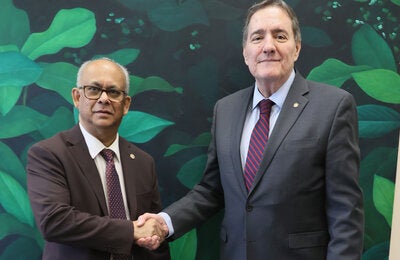
This week, the Protocol, which has already been ratified by six Latin American countries, reached the 40 Parties required for its entry into force. A further tobacco control milestone was reached on 28 June, when the World Trade Organization (WTO) backed Australia's tobacco packaging law, a move which should encourage other countries to advance towards similar policy.
Washington, DC, 29 June 2018 (PAHO/WHO) - The Protocol to Eliminate Illicit Trade in Tobacco Products has reached the number of Parties required for it to become international law, which will come into force in 90 days.
This protocol, which seeks to eliminate all forms of illicit trade in tobacco products, including the illegal production and sale of these products, forms part of the World Health Organization's Framework Convention on Tobacco Control (FCTC). It establishes a range of measures to prevent illicit trade, promote law enforcement, and provides the legal basis for international cooperation.
So far, six countries from the Americas region have ratified the Protocol, which will become law on 25 September: Brazil, Costa Rica, Ecuador, Nicaragua, Panama and Uruguay.
On 27 June 2018, the conditions for the entry into force of the Protocol were met with the ratification of the United Kingdom. As such, the required 40 Parties to the Protocol was reached and the parties will meet for the first time on 8 to 10 October 2018 in Geneva, Switzerland, to discuss next steps towards implementation.
During this meeting, parties will also discuss issues including: ways to prevent the illicit trade in tobacco through better management of the tobacco product supply chain; which type of sanctions should be employed in order to ensure compliance with the law; and how to ensure the implementation of international control mechanisms.
It is estimated that around 10% of the global cigarette market is illicit, a figure that exceeds 50% in some countries. The illicit trade in tobacco product presents a grave problem for public health as it ensures greater access to cheaper products, particularly for more vulnerable groups such as young people and those with fewer resources. It also weakens tobacco control policies and leads to a loss in public income.
WTO backs Australia's plain tobacco packaging law
In the same week, a panel from the World Trade Organization (WTO) ruled against complaints brought by several countries concerning Australia's plain tobacco packaging law, which falls in line with directives of the World Health Organization's Framework Convention on Tobacco Control (FCTC). The panel decided that Australia's plain packaging policy is consistent with the WTO's trade agreements.
In December 2012, Australia was the first country to fully implement plain tobacco packaging. The plain packaging policy prohibits the use of logos, colors, brand images and promotional material on tobacco product packing.
To date, six countries have implemented plain packaging laws (Hungary, Ireland, France, New Zealand, Norway and the United Kingdom). A further six countries have approved laws that have not yet been implemented (Burkina Faso, Canada, Georgia, Romania, Slovenia and Thailand). Several other countries are also considering the implementation of packaging policy.
WHO and the Framework Convention on Tobacco Control Secretariat provided the WTO with an amicus curiae which, among other things, summarizes the public health evidence in support of plain packaging policy, as well as the relevant provisions from the Framework Convention and its directives.
The WTO's decision averted further obstacles from the tobacco industry and served as an additional battle won, following that of Uruguay in 2016.
In that instance, Uruguay won an international legal case brought by the Philip Morris tobacco company, challenging the tobacco control regulations implemented by the country in compliance with the FCTC. In July 2016, the World Bank's International Centre for Settlement of Investment Disputes (ICSID) decided in favor of Uruguay, confirming that the measures applied by the country to reduce tobacco consumption did not violate the trade rights of the tobacco company as established in agreements between Uruguay and Switzerland, where the company is headquartered.
The tobacco company first presented its claim in February 2010, after Uruguay implemented regulations requiring health warnings to cover 80% of the main surface of tobacco presentation and limiting manufacturers to one unique package per cigarette brand, in line with the Framework Convention.
Tobacco kills some 6 million people worldwide each year, both through direct consumption and exposure to second hand smoke. At least 1 million of these deaths occur in the Americas.
PAHO continues to work with countries in order to strengthen tobacco control in the region of the Americas, both through the ratification and application of the Protocol to Eliminate Illicit Trade in Tobacco Products, and in the implementation of plain packaging, among other measures.
Links
- Protocol to Eliminate Illicit Trade in Tobacco Products
- WHO Framework Convention on Tobacco Control
- PAHO recognizes Uruguay for defending tobacco control policies against commercial interests
- PAHO/Tobacco



